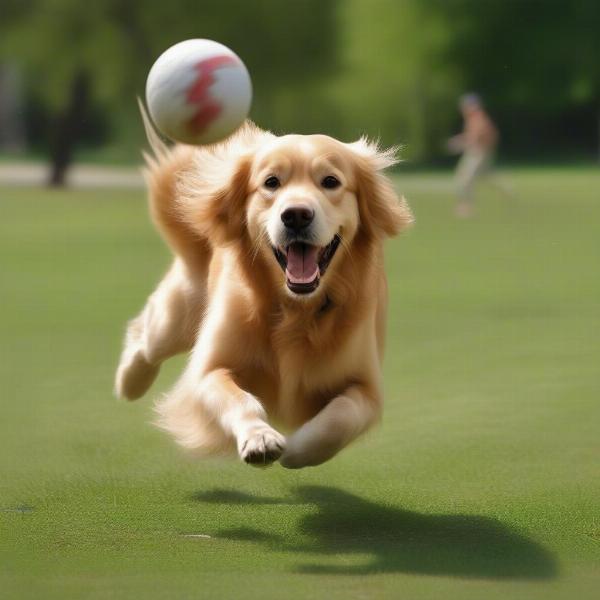An excited dog is a happy dog, right? Well, most of the time! While a bit of exuberance is perfectly normal and even endearing, excessive excitement can sometimes be challenging to manage. Understanding why your dog gets excited and learning how to channel that energy positively is key to a harmonious relationship. This article explores the reasons behind canine excitement, offers practical tips for managing it, and helps you discern when excitement might signal something more.
Decoding Canine Excitement: Why Does My Dog Get So Excited?
Dogs express excitement in various ways, from vigorous tail wags and playful bows to excited barking and jumping. These behaviors are often triggered by anticipated pleasures like walks, playtime, or the arrival of loved ones. However, understanding the root of this excitement can help you better manage it. Is it purely joy, anticipation, or could there be an underlying element of anxiety or frustration?
Common Triggers for Canine Excitement
- Social Interactions: Seeing familiar faces, meeting new dogs, or even interacting with their beloved humans can send a dog’s excitement levels soaring.
- Anticipation of Rewards: The promise of a walk, a tasty treat, or a favorite toy can trigger a flurry of excited behaviors.
- Environmental Stimuli: New smells, sights, and sounds in a novel environment can be incredibly stimulating for dogs.
- Frustration or Anxiety: Sometimes, what appears as excitement can actually be a manifestation of underlying frustration or anxiety. A dog that’s confined for long periods or lacks sufficient mental and physical stimulation might exhibit heightened excitement that’s actually a cry for attention or a release of pent-up energy.
Managing an Excited Dog: Practical Tips and Techniques
While a certain level of excitement is natural, an overly excited dog can be disruptive and even dangerous. Here are some strategies to help you manage your dog’s enthusiasm and channel it positively:
- Structured Exercise and Mental Stimulation: A tired dog is a well-behaved dog. Provide plenty of opportunities for physical exercise through walks, runs, and playtime. Engage your dog’s mind with puzzle toys, training sessions, and interactive games.
- Training and Reinforcement: Teach your dog calming cues like “sit,” “stay,” and “down.” Reward calm behavior with praise and treats. Consistency is key.
- Desensitization and Counter-Conditioning: Gradually expose your dog to exciting stimuli while rewarding calm responses. This helps them learn to associate these triggers with positive, relaxed experiences.
- Creating a Calm Environment: Establish a predictable routine and a quiet space where your dog can retreat when feeling overwhelmed.
- Avoiding Reinforcement of Unwanted Behaviors: Don’t inadvertently reward excited behaviors by giving in to demands or providing attention when your dog is overly stimulated.
 Dog Playing Fetch in Park
Dog Playing Fetch in Park
When to Seek Professional Help
If your dog’s excitement seems excessive or is accompanied by aggressive or destructive behaviors, it’s essential to consult a veterinarian or a certified dog trainer or behaviorist. They can help determine if there’s an underlying medical or behavioral issue contributing to the problem and develop a tailored plan to address it.
Conclusion
Understanding and managing your excited dog is crucial for a happy and balanced relationship. By providing adequate exercise, mental stimulation, and consistent training, you can help your dog channel their enthusiasm positively and enjoy a more fulfilling life together. Remember, a little bit of excitement is a wonderful thing – it’s what makes our canine companions so special!
FAQ
- How can I tell if my dog’s excitement is actually anxiety? While excitement and anxiety can share some similar outward signs, anxiety often includes panting, pacing, destructive behavior, and avoidance.
- Is it okay to let my dog jump up when they’re excited? While it might seem harmless, jumping can become a problem, especially with larger dogs. It’s best to discourage jumping from the start.
- What’s the best way to calm an overly excited dog? Redirecting their attention with a calming cue, offering a chew toy, or moving to a quieter environment can help.
- Can training really help with excitement? Absolutely! Training teaches dogs self-control and provides them with alternative ways to express their enthusiasm.
- Should I punish my dog for being excited? Punishment is never the answer. It can worsen anxiety and damage your relationship with your dog. Focus on positive reinforcement and redirection instead.
- My dog gets so excited when guests arrive, what can I do? Teach your dog a “place” command where they can calmly greet guests from a designated spot.
- Is it normal for my dog to get excited about their meals? Some excitement is normal, but if it’s excessive, try feeding your dog in a puzzle feeder to slow them down and engage their mind.
Related Articles on ILM Dog
About ILM Dog
ILM Dog (ilmdog.com) is your trusted resource for expert advice on dog care, offering guidance on everything from breed selection and puppy care to senior dog health and training. Our team of experienced writers and dog enthusiasts provides practical tips and evidence-based information to help you navigate the joys and challenges of dog ownership. We also offer a range of resources on dog-friendly travel and carefully curated product recommendations to enhance your dog’s life. For personalized guidance and expert support, contact us at [email protected] or call us at +44 20-3965-8624.